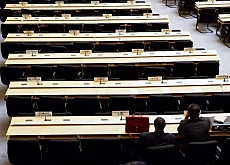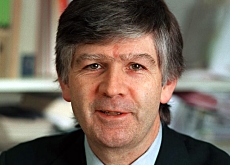Reality dawns after human rights breakthrough

The creation of the new UN Human Rights Council is being lauded as a triumph for Swiss diplomacy, but will it be able to live up to the expectations of its backers?
Questions remain over the role of the United States, and there are fears that urgent issues will be neglected during the replacement of the discredited Human Rights Commission.
The new council, which is due to sit for the first time in Geneva on June 19, was approved by an overwhelming majority of United Nations member states in New York on Wednesday.
The US was one of only four countries to vote against the resolution, insisting that not enough had been done to prevent serious human rights abusers winning a seat on the body.
But diplomats and non-governmental organisations insist the US rejection of the council resolution does not constitute a major setback, interpreting its decision as a “soft no”.
“I always said that I wanted the active participation of the United States. To have them opposed to the council would have been a very bad sign. But that was not how it turned out,” Swiss Foreign Minister Micheline-Calmy told Le Temps newspaper.
Reservations
Washington, while expressing reservations, said it would “work cooperatively” to make the council strong and effective. The US has not said whether it will seek a seat on the council.
It added that it would not withhold money from the UN budget, which will fund the new council at an initial cost of $4.3 million (SFr5.6 million).
“It is important that the US pledged to work with the council because no one wants the US outside the process. That was positive,” Iain Levine, programme director of Human Rights Watch, told swissinfo.
This view is shared by Geneva-based UN Watch, which was part of a coalition of around 45 NGOs that urged major changes to the council resolution.
Executive director Hillel Neuer told swissinfo that the US had made a “principled point”, but he was confident the US would now engage with the council. “I don’t think the US vote will weaken the council in any way. They have already made it clear they want to fund the body,” said Neuer.
“We too thought this resolution was insufficient but that debate is now over. We have to make the best of it and now elect members that are committed to human rights.”
Same old faces
Neuer said he was still concerned that “familiar faces” such as China, Cuba and Zimbabwe would still be there when the council convened for the first time in Geneva.
But Daniel Bolomey, secretary general of Amnesty International Switzerland, said he hoped countries with poor human rights records would be elected to the council.
“I think the participation of countries like China, Russia, Cuba and also the US is needed. Under the terms of membership they would be obliged to report on their own human rights records, and it’s up to NGOs to ensure that these are credible,” he said.
Amnesty said Switzerland and international Geneva now faced a major challenge to ensure the new body lived up to expectations and that urgent human rights issues were not ignored during the changeover.
Amnesty, like other human rights groups, is also worried that mandates for some of the commission’s special rapporteurs could be cut.
Calmy-Rey told Le Temps that the Human Rights Commission’s last session, which resumes on Monday after a one-week adjournment, would probably be shortened to three weeks and would likely concentrate on ensuring a smooth transition process.
“The aim is that the council functions as quickly as possible and under the optimum conditions possible. It is crucial that we do everything to ensure that 2006 does not become a blank year for human rights, that there is no ‘black hole’,” she said.
swissinfo, Frédéric Burnand and Adam Beaumont in Geneva
Swiss Foreign Minister Micheline Calmy-Rey officially launched the idea of a Human Rights Council in March 2004.
A year later UN Secretary-General Kofi Annan said the creation of such a council was part of his reform plans.
The UN World Summit in September 2005 adopted the principle of a Human Rights Council.
It was finally approved by the UN General Assembly on March 15 and will replace the Geneva-based Human Rights Commission.
The 62nd and final session of the UN Human Rights Commission resumes on Monday.
The UN General Assembly will elect the 47-member council on May 9.
The council will sit for the first time in Geneva on June 19.
It will meet at least three times a year for a minimum of ten weeks and can call emergency sessions to respond to crises.

In compliance with the JTI standards
More: SWI swissinfo.ch certified by the Journalism Trust Initiative



You can find an overview of ongoing debates with our journalists here. Please join us!
If you want to start a conversation about a topic raised in this article or want to report factual errors, email us at english@swissinfo.ch.